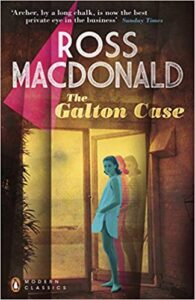WHAT THE COMMENTATORS SAY
Universal Acclaim, Almost
“The writer was right to view The Galton Case (1959) as both ‘a turning point’ and a personal favorite among his books. Though he had already written about exile and semi-recovery, two of the crucial problems of his own American-Canadian life, he hadn’t given them the power that pulsates through Galton. The novel, the only one Ross Macdonald has singled out, in ‘Writing The Galton Case’ for critical discussion, sustains a higher level of inspiration than any previous work from his pen . . . The novel did for him what Sons and Lovers did for D.H. Lawrence, allowing him to face and understand his past . . . Ross Macdonald challenged himself deeply in Galton and, thanks to the introspective effort the challenge posed, grew as an artist . . . The bravery and honesty of his effort confirms both his artistic integrity and manhood.”
Peter Wolfe, Dreamers Who Live Their Dreams: The World of Ross Macdonald’s Novels
“Being focused on one aspect of the Freudian family romance, the son’s journey back home after exile with his family . . . Macdonald surged through The Galton Case as ‘a breakthrough novel.’ The Doomsters and the year of formal psychoanalysis had lowered the temperature of his autobiographical material. Now out in the open, not sequestered in private memory as failure to turn it into a novel, his past was ready for use—not exorcism.”
Michael Kreyling.The Novels of Ross Macdonald
“It is not [as the flap blurb asserts] his ‘most brilliantly plotted work.’ As a detective novel, in fact, it is nearly transparent, its mystery not especially mysterious and its solution fairly obvious. That it nevertheless compels the reader’s attention is testimony to the author’s narrative skill, which is such that the novel works in spite of itself . . . Although it tries to be a detective novel . . . . as Edward Margolies observes, ‘a kind of bourgeois fairy tale’ . . . Coincidence plays a huge part in the novel . . . only through a sophisticated authorial legerdemain does Macdonald manage to distract the reader’s attention from several of them.”
Bernard Schopen, Ross Macdonald
Although Schopen has his reservations about the plotting (as do I) he has no doubt about the importance of the work and the eleven novels that followed, stating that “No one writing in the American detective novel has produced a body of work equal in either volume or overall quality as that of Macdonald’s mature works.”
“Millar created once-removed emotional biography . . . By twisting his and others’ experience into fictional Mobius strips, Millar transmuted the messy stuff of life into fiction without succumbing to overemotional prose . . . Galton gathers momentum and excitement as it unfolds, moving beyond Kierkegaardian bleakness towards forgiveness and hope.”
Tom Nolan. Ross Macdonald: A Biography
“Archer remains wrongheaded during three-quarters of his adventures [in The Galton Case] and pays for it with a beating reminiscent of the violence Macdonald found repellant in Mickey Spillane’s fiction.”
Robert L. Gale, The Ross Macdonald Companion
The Initial Assessment of the Author
In correspondence with his publisher at the time, he wrote, “Now let’s see if I can write a better book. This one doesn’t satisfy me by a long shot.”
A Drumroll, Please
The reviews were generally favorable (excepting Anthony Boucher, who broke his tradition of unconditional admiration for anything Macdonald produced.) But hardback sales were poor—even worse than the disappointing sales of his previous book, The Doomsters. Knopf only ordered two printings, totaling 4,000 copies. The book even failed to earn out the hardcover advance. The paperback edition from Bantam in 1960 sold respectably, but by then Macdonald was up to his ears in yet another crisis involving his daughter Linda.
Let’s move forward and grapple with the text.

Recent Comments